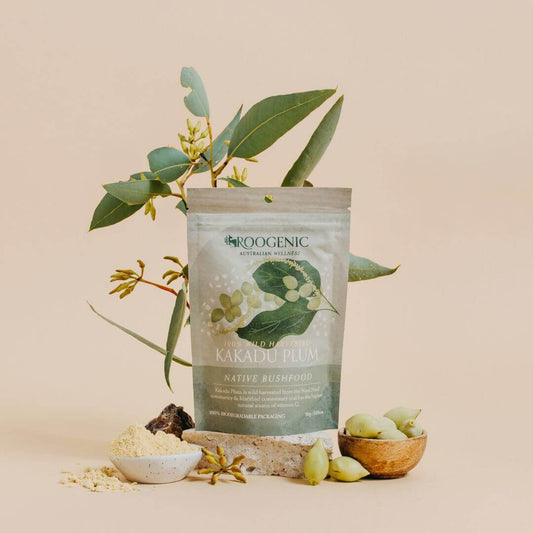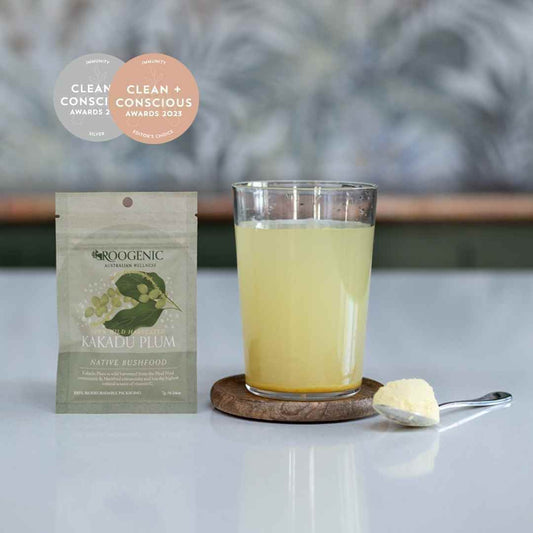Why Vitamin C is Essential for Wellness
Vitamin C is one of the most important nutrients for maintaining overall health, yet our bodies can’t produce it naturally. Instead, we rely entirely on dietary sources to maintain healthy levels.
Rebecca, Roogenic’s in-house naturopath, explains:
"Vitamin C is stored in high concentrations in areas like the brain, adrenal glands, liver, and lungs, key parts of the body that need extra support during times of stress or illness. These stores can deplete quickly if your diet doesn’t provide enough."
Fun Fact: Unlike humans, many mammals can make their own Vitamin C from glucose. Unfortunately, we lost that ability millions of years ago, which means consistent dietary intake is essential.
If you’re looking for ways to naturally support your wellness, read our Winter Wellness Guide for practical tips on staying healthy during the colder months.
So, what exactly does Vitamin C do for your body? Let’s explore how it supports your immune system and energy levels, especially during times when your body needs it most.
Kakadu Plum: Nature’s Richest Source of Vitamin C
When it comes to Vitamin C-rich foods, Kakadu Plum is in a league of its own. This small Australian native fruit contains the highest recorded levels of natural Vitamin C in the world, up to 50 times more than oranges.
Kakadu Plum also provides:
- Antioxidants like ellagic acid and gallic acid help neutralise free radicals.
- Vitamin E and zinc, nutrients involved in immune and skin health.
- Bioactive compounds that may support gut microbiota diversity.
- This makes Kakadu Plum an exceptional addition to a diet focused on immunity and vitality, especially during high-stress or high-demand periods like winter.
Discover more about this extraordinary fruit in our blog: Kakadu Plum: Nature’s Vitamin C Superstar.
Vitamin C and Your Immune System
Think of your immune system as an army with two specialised divisions:
- The innate immune system – your fast-acting, non-specific first line of defence against invaders like bacteria and viruses.
- The adaptive immune system – slower to respond but highly effective, with a “memory” of past threats to provide stronger protection.
1. Protecting Your Infection-Fighting Cells
Vitamin C supports the immune system in several key ways:
- It protects neutrophils (white blood cells that patrol the body for infections) from damage caused by harmful molecules during the early stages of an immune response [1].
- Vitamin C helps these neutrophils undergo apoptosis, a clean, efficient “cell death” process that prevents unnecessary inflammation and tissue damage [1].
- It acts as a guide, improving neutrophils’ ability to follow chemical signals (chemoattractants) to infection sites [1].
Read more about the gut-immune connection in How Your Gut Affects Immunity.
2. Supporting Adaptive Immunity
- Lymphocytes, another type of immune cell, also benefit from Vitamin C. It helps protect them from damage caused by unstable molecules during infections and supports their growth and function. [2]
- Vitamin C is involved in the development and function of Natural Killer (NK) cells, which identify and destroy faulty or infected cells [2].
3. Natural Histamine Regulation
Emerging research suggests that Vitamin C may act as a natural antihistamine, helping to ease allergy-related symptoms by modulating histamine levels [1].
Vitamin C and Energy Production
While Vitamin C doesn’t give you energy like coffee does, it supports your body’s natural energy processes in several ways:
1. Enhancing Iron Absorption
Vitamin C improves your body’s ability to absorb iron from plant-based foods. Healthy iron levels are crucial for reducing fatigue and keeping your energy steady. [3]
2. Supporting Stress Resilience
The adrenal glands, which produce cortisol (the “stress hormone”), are one of the body’s main storage sites for Vitamin C. During stress, your body uses up these stores more rapidly, increasing your need for this essential nutrient. [4]
3. Protecting Your Cellular Powerhouses
Vitamin C helps protect the mitochondria, the “energy factories” in your cells, from oxidative damage. By neutralising free radicals, it supports efficient energy production and overall vitality. [5]
The Takeaway
Vitamin C is more than just an immune booster; it plays a critical role in helping your body fight infections, regulate inflammation, absorb iron, and maintain energy levels.
Our Naturopath recommends prioritising a colourful, nutrient-rich diet to meet your Vitamin C needs naturally. Alongside citrus fruits and berries, Kakadu Plum is a standout source for boosting daily intake, especially for those looking to support immunity during the colder months.
Explore the Power of Kakadu Plum
Kakadu Plum is one of the most powerful natural sources of Vitamin C available. Explore how it can complement your health and hydration rituals with our range of Australian botanical teas.






